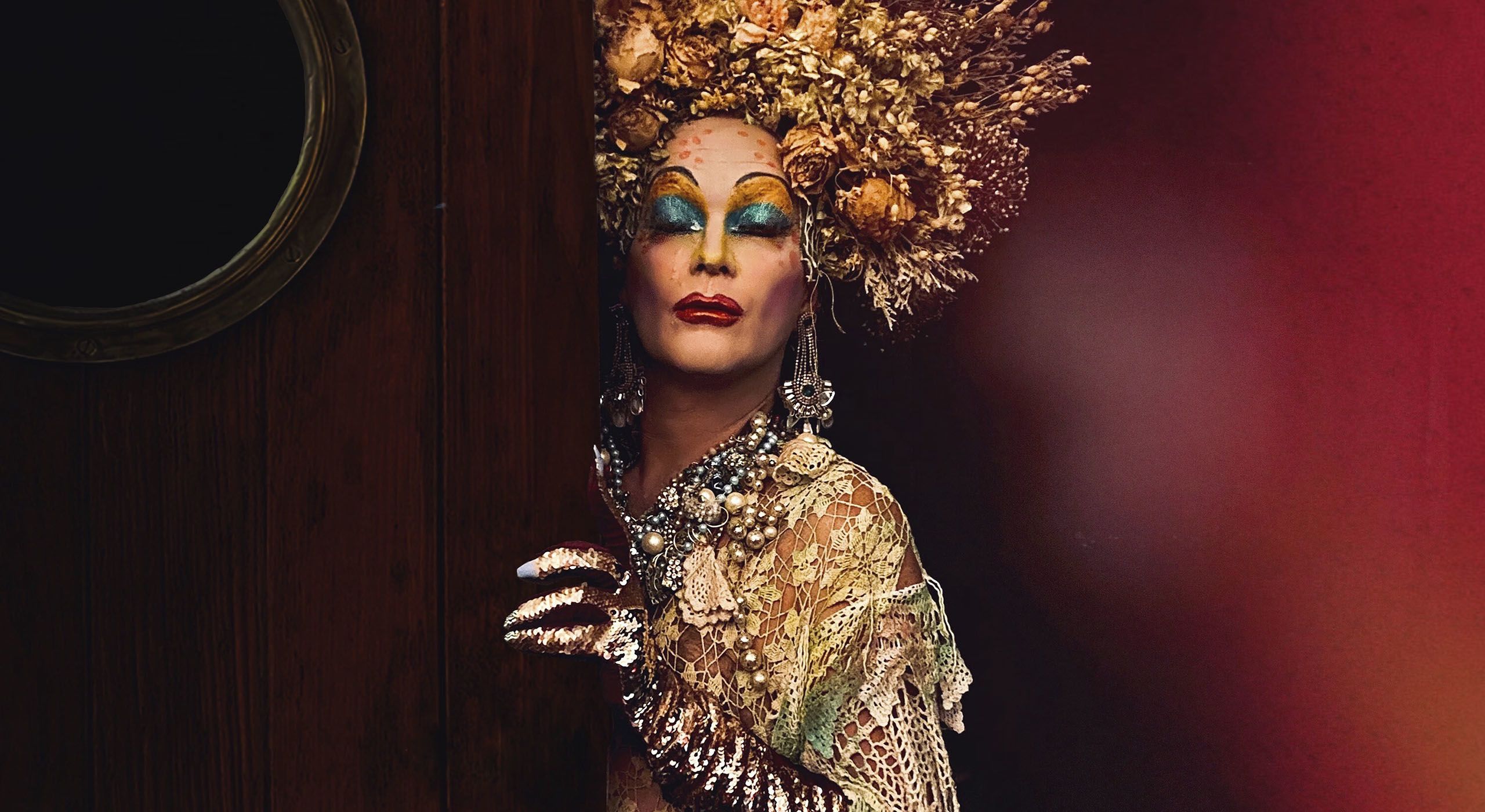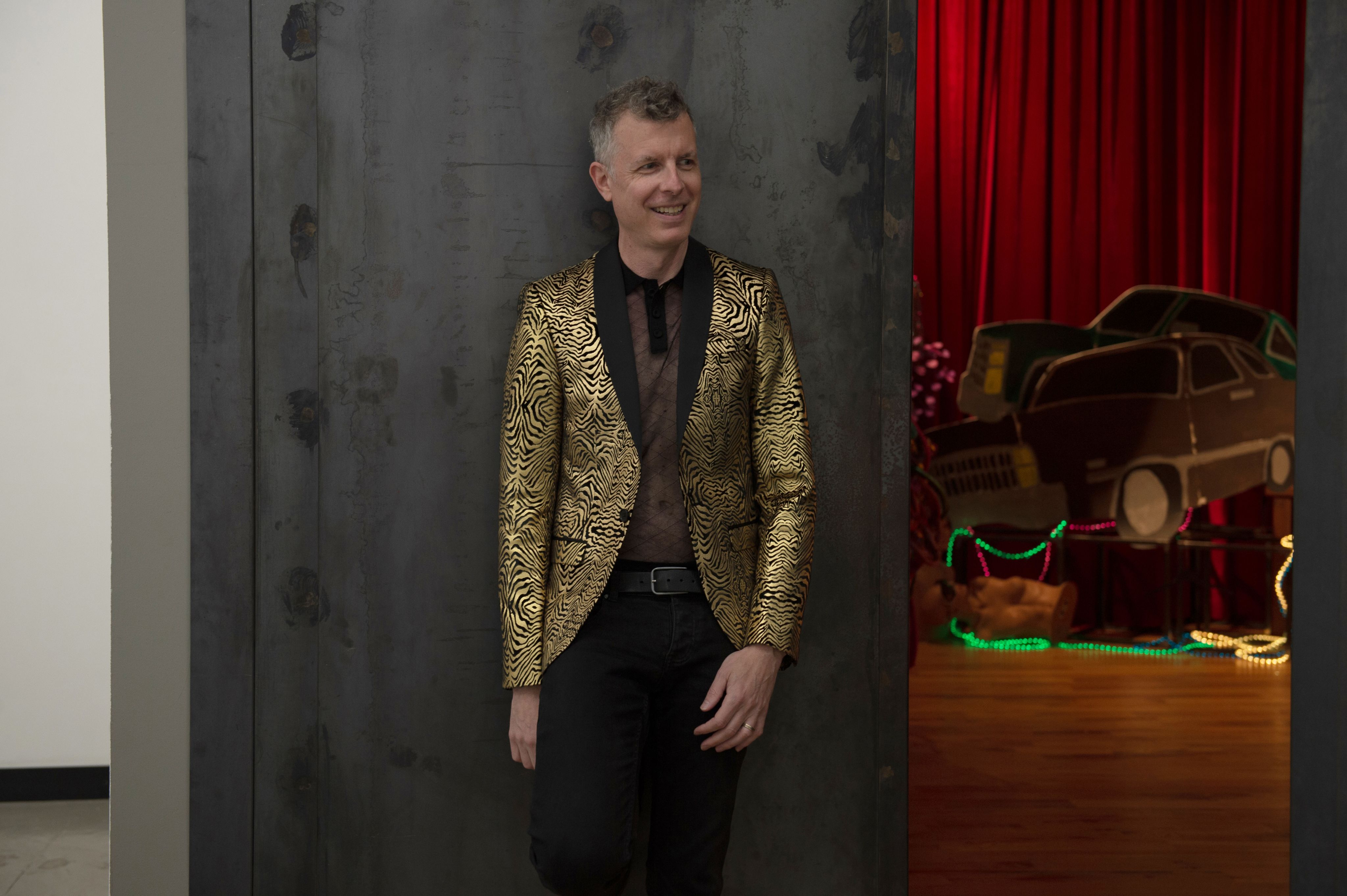
The historically charged musical might of the multi-hyphenate marvel behind A 24-Decade History of Popular Music shares the inspirations behind a thrilling new work.
by Stephen A Russell

“If you’re not invited to the party, throw a better one.”
For the glimmering sun of queer musical resistance that is multi-hyphenate Taylor Mac – who prefers the pronoun judy – art has the power to hold back the surging tides of a concerted backlash against LGBTQIA+ rights won, both at home in the US and abroad, including here in Australia.
Which is why, following the massive success of judy’s festival of fabulousness A 24-Decade History of Popular Music and its reclaiming of the grand (and not so good) sweep of American history through a queer lens oft-obscured – performed in Australia in 2017 and the subject of a remarkable HBO documentary – Mac has turned the attention squarely on LGBTQIA+ heroes.
New work Bark of Millions, a one-night-only rock opera hosted in the Opera House Concert Hall as part of our 50th-anniversary celebrations, channels the power of Ra, the genderqueer god of Egyptian mythology. “One of the first gods of recorded human history, Ra is genderqueer, not male or female,” Mac says.
Ra’s chariot – the Bark – was said to carry the sun around the skies. “At night it battles chaos, and every single morning, it arrives victorious,” Mac says. This core queer victory inspires a whirlwind night of wonder featuring 55 incandescent songs, one for each year since the Stonewall riots, with lyrics penned by Mac. “When we did 24 Decade, the vast majority of 240 songs were about straight people that we had queered by me singing them,” Mac says. “But even though many of the songwriters were queer, the canon isn’t full of songs centred on queerness.”
Bark of Millions corrects that curve, introducing you to Tu’er Shen - a Chinese rabbit god and guardian of sex between men; the rabble-rousing words of great minds like James Baldwin; and asks you to take another look at our brightest stars, including Hollywood icon Greta Garbo.
“Some of them you’ll know, some you won’t, but it’s not a history lesson,” Mac says. “The songs are inspired by the people, but it’s really about a collective getting together to consider queerness.”
“So there was this myth, especially in the religion I grew up with, that queerness meant you were further away from the core of things. And then when you learn something like that, that one of the first gods of world history is actually a queer, it makes you go, ‘Oh, no, maybe queerness is closer to the core.”

A cast of millions
If you’re going to throw a fabulous showdown like Bark of Millions, you’re going to need back-up, including musical director Matt Ray, who first worked with Mac on marriage equality-inspired work The Lily’s Revenge and more recently collaborated to co-write musical The Hang about the last hours of queer philosopher Socrates. “Oh my god, he’s given everything to this show,” Mac says. “Every song is better than the next and it’s really, really remarkable.”

Matt Ray, photo: Amy Touchette
Matt Ray, photo: Amy Touchette
Co-director Niegel Smith is Mac’s eyes. “He handles a lot of the technical side of things because when I’m on stage, I can’t see what’s happening from the house,” judy says. Fellow co-director and choreographer Faye Driscoll has her eyes on their feet. “It’s just thrilling to work with this fierce lesbian choreographer whose vision always elevates everything.”
Ra’s bark is filled with a glittering constellation of stars, with each performer sporting a magnificent costume by Machine Dazzle, “The great designer of the world,” including gender transcendent Australian diva Mama Alto, who was promoted from the position of dandy minion for Mac’s Melbourne performance of 24-Decade.
“The dandy minions were like glorified candy stripers who would perform random acts of fabulousness to the audience throughout the show but weren’t featured in a major way,” Mac says. “But I heard Mama singing and asked her to duet with me. I had this rule that nobody got to sing a solo, because the idea was all the music was filtered through one body [Mac’s]. And I was like, ‘Well, it’s not a queer show if you don’t break the rules. So I invited Mama to sing a solo.”
Mama Alto returns to Mac’s side in Bark of Millions. “When you hear her sing, it’s like she’s opening up the heart of the universe and handing it to you. And it does nothing but make the work better. It doesn’t feel like generosity. It feels like paying attention.”
They’re joined by a magnificent cavalcade of multi-disciplinary performers, including London-based operatic drag star Le Gateau Chocolat and Detroit soul singers Thornetta Davis and Steffanie Christi’an. The latter two were recommended to Mac while judy was working on the 1960s section of 24 Decade in the city known as the heart of Motown.
“Thornetta is our only straight ally of the 15 singers; everybody else is a queer,” Mac notes. “Usually it’s the other way around, so it changes the way people think of the blues. Of course, they were started by bull dykes, but it also changes the way people think of how they can interact with queerness. It just makes all of our lives better.”

Photo: Gregory Kramer
Photo: Gregory Kramer

Taylor Mac: Little Fang
Taylor Mac: Little Fang
New school
Mac wasn’t much of a student growing up in Stockton, California, separated from the San Francisco Bay Area geographically by the vast San Joaquin River Delta and by millions of miles philosophically. “I got B’s and everything, but I didn’t work hard,” judy says. “I would do my homework on the bus on the way to school or in the class before. So I wasn’t that curious as a kid, because I was just trying to survive.”
As far as Mac knows, the first time judy ever met another queer person was at an AIDS rally in San Francisco in 1987, surrounded by a cast of thousands. A new way of being was presented. “When I finally got myself to a place where I wasn’t feeling like I had to watch my back every second of every day, my curiosity was allowed to breathe a little bit more, and I found that I had a drive to understand the world.”
It opened up a desire to discover what had been kept from judy. “It’s not just queer stuff. It’s being told that Columbus discovered America or that Cook discovered Australia. And you haven’t even been lied to. People didn’t even know the truth to tell you. They’ve been taught lies too.”
“Knowing is being open to uncertainty. “I commit to the Socratic method, asking questions, to ask questions, to ask questions… being in perpetual curiosity,” Mac says. “And perpetual inquiry is very queer.”
Mac’s proudly following in the footsteps of a long line of queer theatrical forebears, including Socrates and his contemporary Euripides, “a weird kind of hybrid writer who didn’t write comedies or tragedies, but actually created the first dramedies.” Judy also credits French playwright Molière, mythologically-inspired drag artist Ethyl Eichelberger and surrealist Sam Shepard. “There’s always participation, to some degree, in their work,” Mac says. “An element of street performance and festival, and why today differs from any other day. I feel Tennessee Williams on my shoulder all the time, going, ‘Don’t say that, say it this way’.”

Just another brick in the wall
Who said and did what and when is part of the building blocks of Bark of Millions, which takes a leaf out of the Daughters of Bilitis playbook, the first lesbian activist organisation in the US so-named after a contemporary of fellow poet Sappho. The Australian branch was formed in 1970, eight years before the first Mardi Gras protest. “One of their goals was to add to ‘the living library of the deviant theme’. And so that’s what we decided we would do, writing a song for every year after Stonewall.”
History is, of course, open to interpretation in the truest Socratic sense. “I’m not interested in who actually started the Stonewall riots,” Mac notes. “I’m more interested in who we want to have started them and why. We have to reach out to the person who is the least normative in our community and see them as our icons, showing us the way in many different ways besides throwing a fucking brick. I don’t want to take away from that brick, but it’s about years and years of activism before that to get to that moment, and years and years of activism after. It’s more about being part of the continuum than it is about nailing down the accuracy.”
Mac loves that Marsha P. Johnson is now centred in these discussions. “I love that the narrative is focused primarily on a trans woman who is also very genderqueer, as many trans people are, and many genderqueer people are trans. Marsha was this beautiful Ra, somewhere in between it all.”
Basking in the glow of Ra’s sun is good for us all. “Queer people have been around for millions and millions of years and we’re always dragged through the mud, but we always show up victorious. We’re still here, you can’t get rid of us. We’ve just gotta keep showing up.
“A bark is also a shout, the shout of millions. Through declaring ourselves, we are all on this boat together, dragging the sun with us as best we can.”
